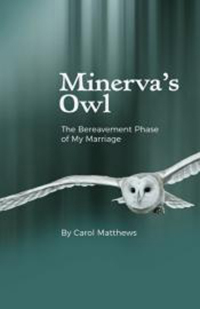Reviews
Nonfiction Review by Susan Braley
Carol Matthews, Minerva's Owl: The Bereavement Phase of My Marriage (Fernie: Oolichan, 2017). Paperbound, 151 pp., $17.95.
 In Minerva's Owl, Carol Matthews asks: “And what does it all mean, these remains of your days? And the remains of mine?” In her latest memoir, written after the death of her husband Mike, Matthews shares her five-year search for answers.
In Minerva's Owl, Carol Matthews asks: “And what does it all mean, these remains of your days? And the remains of mine?” In her latest memoir, written after the death of her husband Mike, Matthews shares her five-year search for answers.
Although Matthews explores the profundity of grieving, she balances this raw pain with new ways of seeing. As her subtitle suggests, she views life after Mike’s death not as widowhood, but as “a distinct phase of our continuing marriage. One in which we are apart and yet together.” She reviews their years as a couple to perceive them in a fresh light: “By returning to the place where we started, I do, in [T. S.] Eliot’s words, know that place for the first time.” When she transcribes some of Mike’s papers, she finds herself “falling in love again….To look objectively at the strange and wonderful way you had with words. I am determined to keep you close.” At the same time, she begins to welcome the quiet, during which she can “remember the face [she] had before [she] was born.” She observes that arriving at this perspicacity late in life aligns her with the Roman goddess of wisdom, Minerva, whose owl “takes flight only with twilight closing in.”
Mythical and literary allusions add depth to this familiar narrative of loss. In dark moments, Matthews finds solace in Tennessee Williams’ image of a loved one’s “blinded hand”; she begins her chapters with poets, like Matthew Arnold on the healing power of dream and Theodore Roethke on slow waking: “What falls away is always. And is near.” She includes sustaining imagery of her own: candles in high-rise windows during a power outage, her family of three enacting the pattern of the solar system on a beach.
At times, however, her writing loses some vigour. Mike is called her “better half”; Leonard Cohen’s ubiquitous light in the crack of everything is invoked. Some analogies, such as marriage as musical composition, seem strained, particularly when grouped with other analogies. Etymological definitions for words like “longing” or “cowabunga” sap energy from the lyricism of the scenes around them.
Yet, in a memoir about unspeakable loss, it is understandable that language falls short. Matthews admits “there are no words sufficient for this aching void.” Nor does form or pattern illuminate: Julian Barnes’ definition of grief as vertical and mourning as horizontal delivers small comfort to her. Even her much-loved labyrinth inspires no clear direction.
Where Minerva’s Owl finds its strongest voice—where it sings—is in broken language and not-knowing. In “Grieving,” the chapter on Mike’s illness and dying, the syntax makes fear palpable: “[Y]ou lying on the floor, saying Lift me up, lift me up. You in the medical ward holding earphones to your head, listening to Mozart on the DVD player, tears in your eyes, saying, It lifts me…the music lifts me.”
The author lets her anguish rupture the memoir’s more composed sections. In “Grieving”: “How I wish I’d gone to you when you called out earlier.” In “Mourning”: “How I wish I had fought harder for your life until the last possible second. Raged at the doctors, resisted palliative care.” In “Cleaving”: “[T]he laying out, washing and dressing the body. Oh dear Mike, how I wish I’d done that myself, and not left it to the nurses and the undertaker. I was in such shock. I didn’t know what I was doing.” Throughout the book, “We didn’t know”—in Mike’s voice and her own—is a poignant refrain.
Matthews’ reflections on her husband prompt her to recast qualities that she once saw as flaws. (In contrast, she seems to be unduly hard on her own failings.) When, in their earlier years, he chose to focus on fishing and street theatre instead of finishing a master’s degree, she thought him irresponsible; now she sees his choices as living in the present and embracing its pleasures. When he sang, acted, danced, wrote poetry, made pies, collected hats, and made people laugh, she urged him not to be excessive. Now she recognizes that his passion “added life to our lives. Everything [he] did was intense and absorbed [him] completely.” She notes how others celebrated his “boundless positivity,” how he imbued everything with value, worrying about “some small thing…left out in the rain.”
In the years after Mike’s death, Matthews herself discovers a more immanent knowing. She opens to the “stretches of time and space…beyond our understanding.” Sometimes she “feels [Mike] wrapping a sweater or jacket around her shoulders”; she believes that “nothing of [him] has disappeared, that all [his] energy is still around but just less orderly.” She no longer sees herself as “lessened,” but rather “empowered by all that we’ve been together.”
In the final chapter, “Surviving,” Matthews acknowledges that she is “more than surviving.” She offers, in her memoir, more than “a blinded hand” to readers who have suffered the deep loss of “we.”
—Susan Braley









